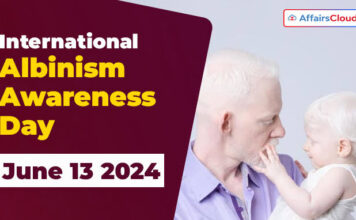On this year’s International Albinism Awareness Day, the Albinism Association of Nigeria revealed that a minimum of two of its members succumb to skin cancer each month due to inadequate access to healthcare.
The association called upon the Federal Government to reinstate complimentary cancer treatment to prevent premature deaths among albinos.
It emphasized the need for Nigerians to recognize that individuals with albinism, due to their lack of melanin, the skin’s protective pigment, are susceptible to skin cancer and vision issues. Therefore, financial assistance is essential for acquiring sunscreen and protective clothing from an early age.
Individuals with albinism face two primary health challenges – visual impairment and increased vulnerability to skin damage from UV rays, which can lead to skin cancer.
This information was disclosed as the association observed the day under the theme, ’10 years of IAAD: A decade of collective progress’.
The theme for this year acknowledges the joint efforts made in the past ten years to advance understanding, acceptance, and support for people living with albinism.
In 2014, June 13 was designated as International Albinism Awareness Day by the United Nations, the selection commemorating the date of the initial UN resolution on albinism in 2013.
Wakadaily learnt that,The President of the Albinism Association of Nigeria, Bisi Bamishe, stressed that skin cancer is largely preventable when individuals with albinism are able to exercise their health rights. She expressed regret that misconceptions about albinism persist, leading to discrimination, stigmatization, and social exclusion.
Bamishe acknowledged the substantial progress made over the past decade in the albinism advocacy, including increased awareness, advocacy efforts, and policy reforms. She highlighted the necessity for ending all forms of discrimination against individuals with albinism.
She mentioned, “’ It is worth noting that much work remains to be done to address the persistent challenges faced by persons with albinism.
“These include; discrimination and stigma, leading to social isolation and marginalisation-limited representation and inclusion in the media, education, and employment.”
Bamishe emphasized the need to tackle ongoing violence, persecution, and healthcare disparities, including fatal attacks, physical harm, and inadequate medical care, especially in low-income nations, in order to ensure the well-being and safety of all individuals.
“In Nigeria for example, we lose at least two people every month to skin cancer. Skin cancer is highly preventable when persons with albinism enjoy their health rights.
“This includes access to regular skin checks, sunscreen, UV umbrella, sun protective clothing, and sunglasses.”
On this significant occasion, we recognize the advancements achieved and reaffirm our dedication to building a society that celebrates diversity, fosters inclusivity, and provides equal opportunities for all.
“We urge governments, international organisations, and civil society to join us in addressing the remaining gaps and ensuring the full enjoyment of human rights by persons with albinism.”
She urged the Federal Government to increase its efforts in providing medical treatment for individuals with albinism who are battling skin cancer in the country.
Bamishe noted that this year’s celebration aims to acknowledge the progress made by the albinism community, while reaffirming their commitment to advancing their cause.
She explained that albinism is a rare genetic condition present at birth, emphasizing that it is non-contagious and a natural part of human diversity.
she noted, “Albinism results in lack of pigmentation of melanin in the hair, eyes, and colour, causing vulnerability to the sun and bright light.
“In all types of albinism, both parents must carry the gene for it to be passed on, even if they don’t have albinism themselves. Almost all persons with albinism are visually impaired and are prone to developing skin cancer. Unfortunately, there is no cure for the absence of melanin. “
She expressed appreciation for the Federal Government’s initiatives in supporting individuals with albinism, while encouraging them to further intensify their efforts and provide additional support to address the community’s ongoing challenges.
“We want to express our appreciation to the Federal and state government as well as development partners, most especially Disability Rights Fund and Sightsavers, for their tremendous support to the albinism community in Nigeria.
“There is more work to be done. By spreading awareness about albinism, we can help to make the world a better place for those affected by this condition.
“We can help them to feel more supported and accepted, and we can help to raise awareness about the importance of diversity and inclusion”, Bamishe highlighted.
